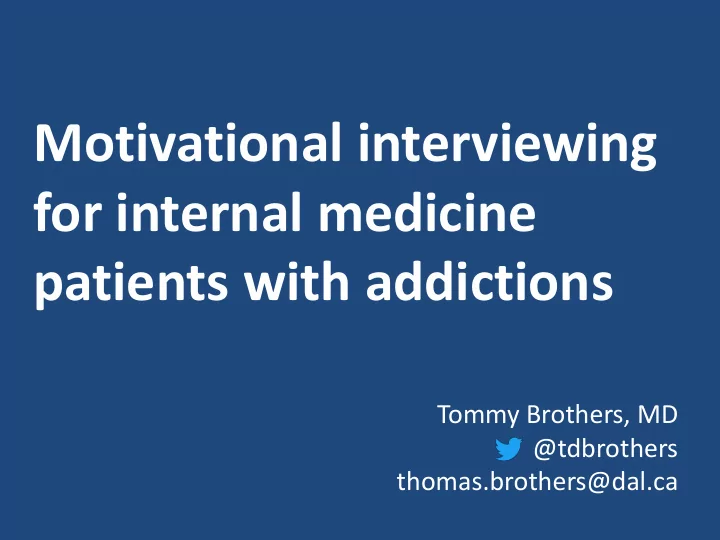

Motivational interviewing for internal medicine patients with addictions Tommy Brothers, MD @tdbrothers thomas.brothers@dal.ca
CSIM Annual Meeting 2019 Conflict Disclosures Definition: A Conflict of Interest may occur in situations where the personal and professional interests of individuals may have actual, potential or apparent influence over their judgment and actions. “I have no conflicts to declare” Company/Organization Details Advisory Board or equivalent Speakers bureau member Payment from a commercial organization. (including gifts or other consideration or ‘in kind’ compensation) Grant(s) or an honorarium Patent for a product referred to or marketed by a commercial organization. Investments in a pharmaceutical organization, medical devices company or communications firm. Participating or participated in a clinical trial
CSIM Annual Meeting 2019 The following presentation represents the views of the speaker at the time of the presentation. This information is meant for educational purposes, and should not replace other sources of information or your medical judgment. Learning Objectives: • Apply principles of motivational interviewing, trauma-informed care, and harm reduction when working with patients experiencing medical complications of severe substance use disorders. • Consider how these approaches may enable us to provide more compassionate and effective care Brothers: Motivational interviewing in patients with addictions – October 3, 2019
@CATIEinfo
Harm reduction • Meeting people “where they are” • Helping people identify and achieve their goals with non-judgment • Promoting health without requiring abstinence from substances as a prerequisite
Harm reduction • Meeting people “where they are” • Helping people identify and achieve their goals with non-judgment • Promoting health without requiring abstinence from substances as a prerequisite
Trauma-informed care 5 principles: 1. Trauma awareness and acknowledgment 2. Safety and trustworthiness 3. Choice, control, and collaboration 4. Strengths-based and skills-building care 5. Cultural, historical, and gender issues BC Mental Health. Trauma-informed practice guide. 2013
Stages of change www. porticonetwork .ca
Motivational interviewing - Principles • Express empathy • Develop discrepancy • Roll with resistance • Support self-efficacy • Be curious
Motivational interviewing - Techniques • Ask permission • Ask open-ended questions • Listen reflectively • Summarize • Affirm • Elicit self-motivational change statements
Working with patients who use drugs 1. Assess substance use 2. Discuss difference between drug use, risky use, and addiction 3. Review potential harms 4. Explore goals regarding their substance use Use same, reduce harms • Use less, reduce harms • Stop using (abstinence), reduce harms • Adapted from Giftos J, 2018
@CATIEinfo
Diane Bailey Cindy MacIsaac Lisa Barrett Dave Martell Julia Belliveau Trish McKay Dalhousie Faculty of Medicine Matt Bonn Ashley Miller R.S. Smith Fellowship in Medical Emily Cameron Patti Melanson Research Sam Campbell Kim Mosseler Jolene Cook Tiffany O’Donnell Canadian Society of Emma Garrod Holly Richards Internal Medicine Leah Genge Steve Robinson Hui Lee Health Promotion HaliFIX OPS Ken Rockwood Scholarship HANDUP Dave Saunders John Fraser Andrea Sereda @tdbrothers Sam Hickcox Rick Swaine thomas.brothers@dal.ca Sean Hurley Natasha Touesnard Elaine Hyshka Colin Van Zoost Lois Jackson Duncan Webster Susan Kirkland
thomas.brothers@dal.ca @tdbrothers
Recommend
More recommend